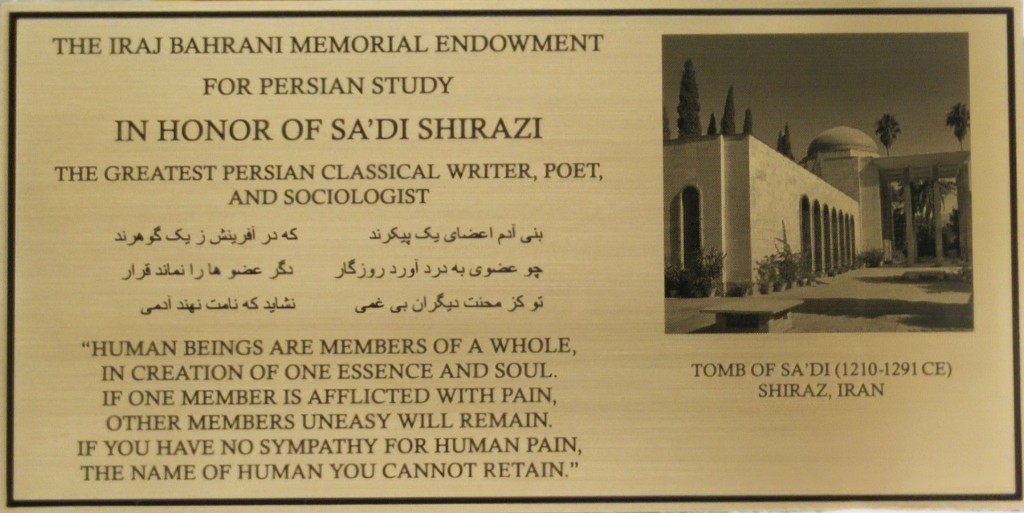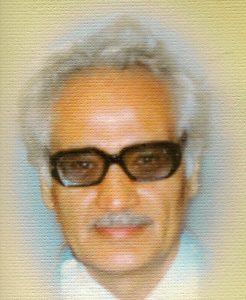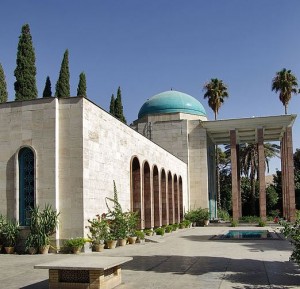
Plaque honoring the Iraj Bahrani Memorial Endowment
 In honor of Sa’di Shirazi
In honor of Sa’di ShiraziThe Greatest Persian Classical Writer, Poet and Sociologist
ONE CANDLE CAN LIGHT A CITY
In December 2014 the children of the late Iraj Bahrani, Dr. Otarod, Dr. Ashkan and Sonia Bahrani generously established the Iraj Bahrani Memorial Endowment for Persian Study in honor of Sa’di Shirazi. This new permanent endowed fund of $25,000 will assist the Library in acquiring books, journals, and electronic resources to advance the Persian studies collection and acquire materials about Persian language, culture, and philosophy.
Iraj Bahrani was born in 1925 in Fars province of Iran. At the age of fifteen Iraj Bahrani’s life took a dramatic turn when his postmaster father, (میرﺯﺍ علی اکبر بحرﺍنی٬ دﺍلکی دشستستاﻥ اﯾران) Mirza Ali Akbar Bahrani, from Daleky Dashtestan, Iran martyred during World War II fighting for justice in his community. Iraj then sacrificed dream of medical school and with spiritual support of his strong willed mother accepted full responsibility for his five younger siblings.
Iraj’s first job was building roads for the Allies to help carry supplies from the deep south to the north in order to aid the Russian defense against the Germans. This road became known as the Bridge to Victory.
Fueled with determination and love for his father, family, and fellow man Iraj became the post-master general of Iran and helped put his siblings and his own children through University and watched them achieve success. He was a candle that burned bright, illuminating all those around him with the spirit of his father’s love of all mankind and his mother’s generosity. Iraj Bahrani passed away in 1991.
The endowment also honors the great Persian poet, Sa’di Shirazi (1210-1291) who was born in Shiraz, Iran. Sa’di lost his father in early childhood, but with the help of family he was able to complete his education, for those reasons he was affectionate towards the humanity which is reflected in this poem:
Sa’di wrote two of the most significant Persian works, The Bustan (The Orchard) and the Gulestan (The Rose Garden). His opinion of Gulestan is shown in the following poem which is shared not only by the Persian speaking population, but universally, too:
Sa’di’s poems exercised wide influence in India, Central Asia and as far as North Africa. His poems emphasized the interdependence of all mankind regardless of nationality, race and religion.
The Gulestan is mainly in prose; the stories and personal anecdotes are interspersed with a variety of short poems which contain proverbs, advice and humorous reflections:

Tomb of Sa’di
Shiraz, Iran
1210-1291
The Bustan is entirely in verse and contains stories that illustrate virtues encouraged justice, liberality, modesty and contentment:
To make a tax-deductible contribution online in support of the Iraj Bahrani Memorial Endowment for Persian Studies, go to giving.unc.edu/gift/lib/, select “Search for Funds” and enter “Bahrani.” Select the fund and enter the amount of your gift. Or, send a check, payable to Friends of the Library, UNC-Chapel Hill, noting the fund name to: UNC-Chapel Hill, PO Box 309, Chapel Hill, NC 27514-0309.
For more information about the Library’s Persian studies collection and ways to support it, contact the University Libraries Development Office. Information about the Persian Studies program at UNC is available at persian.unc.edu.


